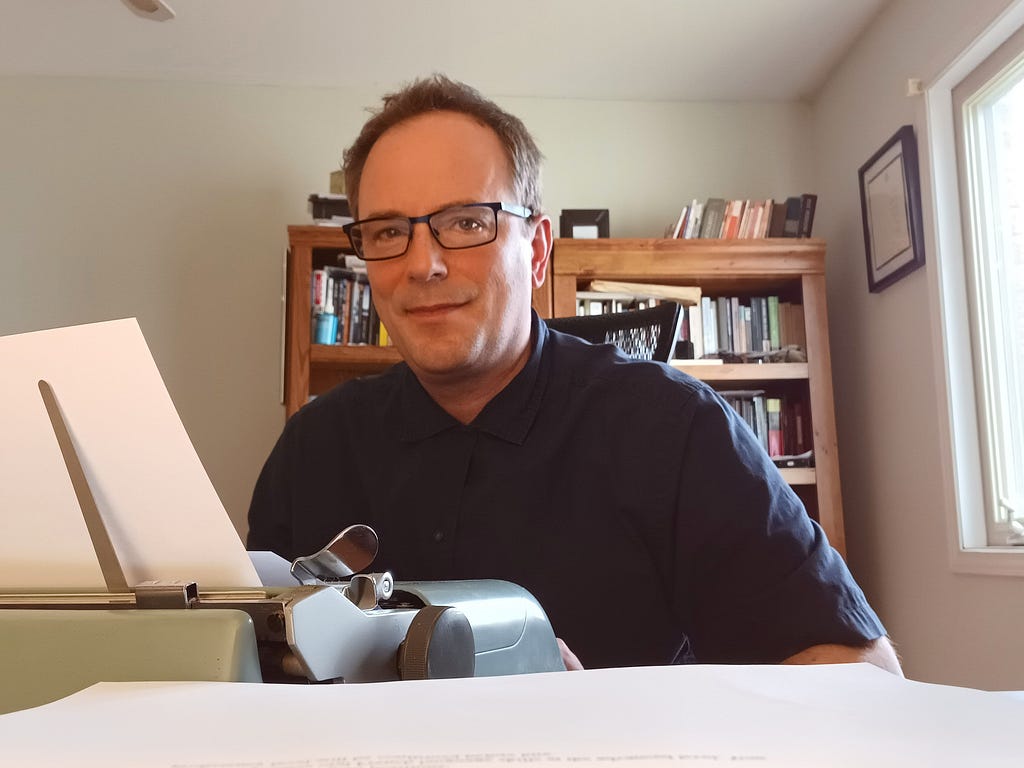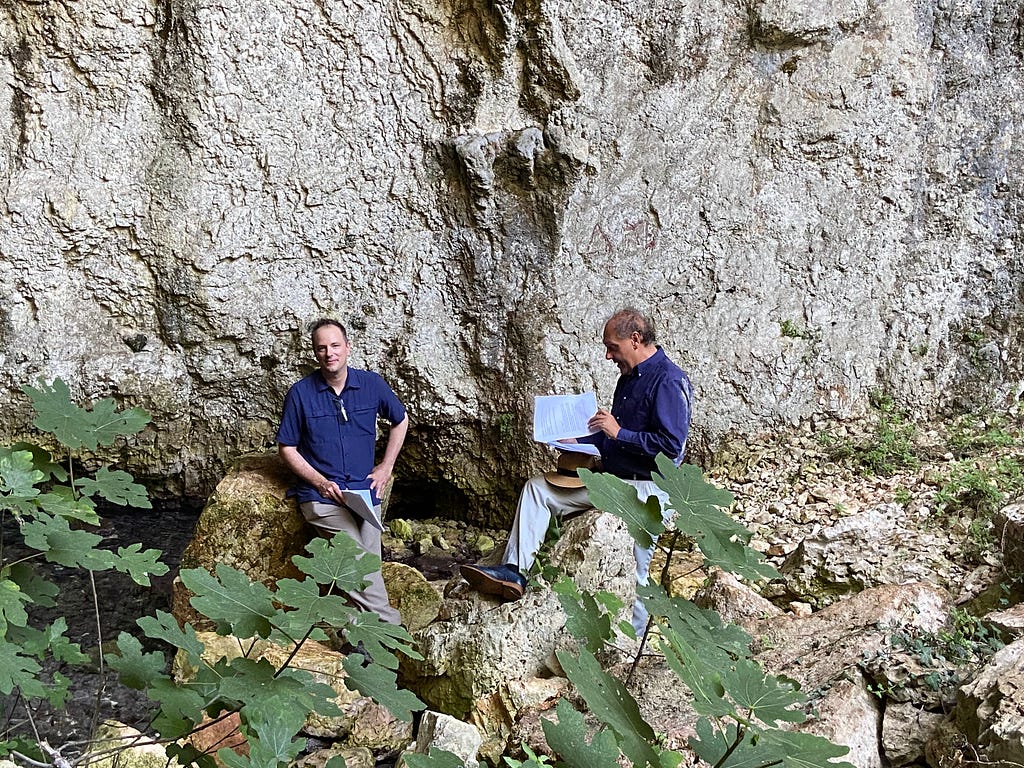
Write 100 words a day. It doesn’t matter what you write, or when, but if you can write 100 words a day good things will happen. In the beginning I spent a lot of time trying to find the right words to write. Hours went by, and the sentence remained incomplete. I was trying to sculpt without any clay. When I started writing 100 words of anything a day, I created a safe, judgement-free zone for words to feel at home. And they brought their friends. At the end of the year you will have 36, 500 words to cook with, and you’ll be surprised by all the ingredients at your disposal.
As a part of our series about “5 Things I Wish Someone Told Me When I First Became An Artist” I had the pleasure of interviewing Jason Heroux.
Jason Heroux was the Poet Laureate for the City of Kingston from 2019 to 2022. He is the author of four books of poetry: Memoirs of an Alias (2004); Emergency Hallelujah (2008); Natural Capital (2012) and Hard Work Cheering Up Sad Machines (2016). His recent books include a short fiction collection Survivors of the Hive (Radiant Press) and two poetry chapbooks: New and Selected Days (Origami Poems Project) and Something or Other (above/ground press).
Thank you so much for doing this with us! Can you tell us the story of how you grew up?
I was born in Montreal in 1971, and have a younger brother, Darren. We lived in front of a General Foods factory. I loved imagining things. I imagined I was a scientist. I had a microscope and some test tubes. I’d mix potions together, using household ingredients: shampoo, milk, orange juice, etc. I imagined I was a private investigator, put a sign on my bedroom door. A friend of mine hired me to find her missing nickel. I found it, but my fee for services was a nickel, so she broke even. I imagined I was a writer, wrote comic books and film scripts and stories. I suppose I’m still imagining that I’m a writer.
Can you share a story with us about what brought you to this specific career path?
It all started when I was a toddler. I pulled my parents’ books off the shelf and scribbled with my crayons all over every page. My parents caught me, put the books back on the shelf, and the next day I would do it again. My parents didn’t yell at me, or punish me, or tell me it was wrong. I think those crayon scribbles were my first poems.
Can you tell us the most interesting story that happened to you since you began your career?
One recent interesting story happened last year when I visited Greece. I was introduced to Gerasimos Galanos, the Deputy Mayor of the town of Lixouri, because we were both poets. We weren’t able to communicate with each other, except through a translator. We ended up doing a poetry reading together in a Greek cave. There was hardly anyone there, except for a few family members, and one or two tourists, but it was one of the most memorable poetry readings I’ve ever experienced. Galanos told me, through the translator, that we “shared the same madness … the madness of poetry.” So true.
What are some of the most interesting or exciting projects you are working on now?
I have a few exciting projects on the go. A collection of prose poems is coming out next year. I’m currently working on a strange hybrid of a “memoir / self-help book / experimental novel” with the working title How to Stop Writing Poetry. I also feel blessed to have two collaborative poetry projects in progress. One is with the wonderful Norwegian prose poet Dag T Straumsvag, and it’s a project called Bingo, inspired by the Orion Bingo hall located near his residence in Trondheim, Norway. The other collaborative poetry project is with my friend and hero Stuart Ross. It’s a project called Hardly, Boys where we each write a sonnet titled after every Hardy Boys novel.
Who are some of the most interesting people you have interacted with? What was that like? Do you have any stories?
I met a really interesting person many years ago at a poet reading. A guy named Jeff Carter, who became a really good friend. He was in a wheelchair from MS, and such an inspirational figure in my life. He inspired many poems, and one of the characters in my first novel Good Evening, Central Laundromat was based on him. Many of the stories I have of him are in that book. I think his spirit will probably appear in an upcoming book as well. He passed away in 1999 but remains a big part of my life.
Where do you draw inspiration from? Can you share a story about that?
My inspiration comes from everything around me. I’m a poetic forager, finding poetry already in place in the environment, out in the wild, discerning the edible from the poisonous, embracing the poetic abundance of the universe. One summer afternoon walking around downtown Kingston, I noticed a dead spider clinging to an expired parking meter. I paused, haunted by the image, and wrote the following one-line poem, which appeared in my first book, Memoirs of an Alias.
“A Moment’s Notice”
A small dead spider on a grey parking meter with its time expired.
How have you used your success to bring goodness to the world?
One of the highlights of my writing career was when I was the Poet Laureate for the city of Kingston from 2019 to 2022. During that time I focused a lot on mentoring local emerging poets, providing them with guidance and feedback and support as they began their journey engaging with “the craft so long to learn.” It was a powerful and humbling experience. It can be scary, and exhilarating, for a new poet to share their work with someone for the first time, and I tried to create a safe and welcoming space for everyone. Many have gone on the publish their work, and I heard from one of them recently that her first book will be appearing next year. I don’t know if that’s bringing “goodness to the world” but it felt good. People grew in positive ways, including myself.

What are your “5 things I wish someone told me when I first started” and why. Please share a story or example for each.
1 . Build a support network. Writing isn’t a race. The road never ends. I approached writing in the beginning like a task done in private. For years I didn’t even tell people I was a writer. That isolation and solitude allowed me to develop certain skills, but it also took me a lot longer to reach where I am today. There’s a wonderful proverb that states: ”If you want to go fast, go alone; but if you want to go far, go together.” It took me decades to realize that.
2 . Aim low, and you’ll be pleasantly surprised. Low expectations can yield unexpected delights. In the beginning I was crushed by every rejection. But at some point I changed my mindset, and began submitting material with the goal of being rejected. Friends and I competed to see who would reach the most rejections in a month. Along the way, a few surprising acceptances appeared. This process will be a useful way to keep writing, learning, and developing through fruitless seasons, and will help carry you forward toward more rewarding opportunities.
3 . Write whatever you want. The weather doesn’t check any reports to decide whether it should rain or shine. It does what it does, and often goes against whatever was predicted or forecasted. Why not write the same way? Follow what compels you. When I first started I wrote typical short stories that looked like all the other short stories people were writing. A small handful were published in journals here and there, but most of them were lost in the crowd. My heart wasn’t in them. But once I started writing the work I wanted to write, I found more success.
4 . Have fun. Writing can be hard, challenging, and lonely. But it can also be a lot of fun. And if it’s not fun, then why do it? There were early years when writing felt like factory work. I’d wake up before dawn, punch the clock, and sit in front of a blank page like it was some kind of assembly line. Routines are important, but writing is more than a daily habit. It’s a daily celebration.
5 . Write 100 words a day. It doesn’t matter what you write, or when, but if you can write 100 words a day good things will happen. In the beginning I spent a lot of time trying to find the right words to write. Hours went by, and the sentence remained incomplete. I was trying to sculpt without any clay. When I started writing 100 words of anything a day, I created a safe, judgement-free zone for words to feel at home. And they brought their friends. At the end of the year you will have 36, 500 words to cook with, and you’ll be surprised by all the ingredients at your disposal.
You are a person of great influence. If you could inspire a movement that would bring the most amount of good to the most amount of people, what would that be? You never know what your idea can trigger. 🙂
I would like to inspire a movement where there are helplines people can call to hear funny feel- good jokes, and benefit from the gift of laughter. Lines would be open 24 hours a day, 7 days a week. 1–800-LAF-ALOT.
We have been blessed that some of the biggest names in Business, VC funding, Sports, and Entertainment read this column. Is there a person in the world, or in the US whom you would love to have a private breakfast or lunch with, and why? He or she just might see this.
I’d love to have lunch with the Vermont Poet Laureate Mary Ruefle. She is one of my favourite writers, and her poems fill my tank with fuel for days. A short lunch with her would last me a lifetime.
What is the best way our readers can follow you on social media?
The best way for readers to follow me on social media is on Twitter (@jason_heroux) and on Instagram (jheroux92).
This was very inspiring. Thank you so much for joining us!
Thank you as well!
Jason Heroux: 5 Things I Wish Someone Told Me When I First Became An Artist was originally published in Authority Magazine on Medium, where people are continuing the conversation by highlighting and responding to this story.
